Cartagena, and in general the Caribbean coast region of Colombia, historically has the highest rate of malnutrition in the country. The problem lies rooted in the severely uneducated and rural life in this region which has many refugees of the internal war between the FARC (Revolutionary Armed Forces of Colombia) and the federal government which has raged on for many years. The number of displaced refugees is not precisely clear but a short visit out of the touristy town of Cartagena to its surrounding neighborhoods changes anyone’s perception.
To get more acquainted with the problem, we visited a well known local institution, founded by a rich Colombian couple to battle malnutrition and focus on family control education. I can’t personally vouch for this organization as I have my doubts about its administration. It’s not their mission that troubles me; it’s their extravagant administrative expenditures which made me think twice. For example, the new building that they are constructing is a multi-million dollar project, which looks more like the “Mall of America” in Minnesota rather than a humble clinic. I might be overly paranoid, but the fact that tons of cocaine goes through the ports of Cartagena to be shipped to North America every week is enough to justify any profligate show to cover the drug movement. It’s a technique that many organized crimes utilize to smooth out their smuggling efforts. We stayed wary of giving any financial support to this particular foundation, but on the mission level it was eye-opening.
As I walked in one of the classrooms, I was shocked to see many girls in their early teens breast feeding babies. Many ranged from 12 to 15 years old, and their petrified innocent looks were telltale signs of abuse and abandonment by the society. These girls were barely old enough to hang up their nonexistence Barbie dolls, yet they had one or more kids already and were expecting more. They didn’t know any better. Nor had the luxury of finding out how.
To reach them in their “natural habitat,” a short 30 minutes ride out of the touristy Cartagena was enough to enter the heart of the slums that no tourist will ever see and even many locals would not dare to go. No paved roads, no running water, dirt floors, shacks with no roofs and the supermarkets in the area were guarded like jailhouses with bars to prevent the hungry population from raiding them.
These families lived on 40 cents a day a person, which itself was a fortune for them. A full day of work only provided them with handful of beans and some rice to feed five or six mouths, and many went hungry day and night. Catalina (not her real name) was a one of the many. Mother of one young one already and with another one in the oven, she was responsible for her seriously ill husband while taking care of her younger brother and sister at the same time. The dingy door-less shack they lived in was nothing more than a few metal sidings and a tarp overhead, with two beds separating the muddy floor from their bodies. Five people slept on two beds at night, cooked whatever they acquired outside, and the females in the constant fear of being raped bathed behind the shack in the open. The torrential rainwater seeped in from every corner and in the dim rays of sunlight sneaking in; it felt more like a ghost house rather than inhabitable living quarters.
It is hard to accept tea from people who have absolutely nothing, but not accepting is harder on their pride. Sometimes when I pack the bike, I stare at all the stuff I carry with me (which is extremely minimalistic by any American standards), and it troubles me to know that I have more things than many have in their entire house. It sickens me to think of all the money the European and American tourists spend in many countries without the slightest regard or even knowledge of the quality of life just a few miles away from their comfortable hotels.
The cost of one meal in a touristy restaurant in Cartagena could realistically feed an entire family in this village for over a week, but no one seems to notice or care. We are too occupied with our own egos, our own comfort and well-beings that we forget that there are souls just a few miles away taking their last breath because they didn’t have what we take for granted day after day: food. We travel with our damn mosquito nets, malaria medication, our specialized money belts and safe wire-mesh backpacks to deter the hungry thieves, yet we’re ignorant of the cause of it.
Cynthia passed some money through the jail-like bars of the supermarket which yielded in two 50lb bags of rice, few bags of beans and other provisions to keep five people alive for a little longer. Catalina had tears in her eyes when she heard that she could feed her family that night as they hadn’t had a bite to eat that day because literally they had nothing to eat. Tears kept coming down her face. It was hard to say what feelings they relayed, but whatever feelings they were; it was very alien to me.
Catalina’s family wasn’t the only one we fed in that village. It was unbearable to be in the position of making the call of who gets to eat and who goes hungry, when you can’t feed everyone. We left Cartagena with heavy hearts.
Don’t forget these people. Help us so we can help them. I hope you were thankful for your blessings on this Thanksgiving Day. I am.

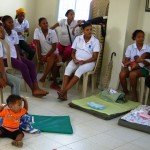
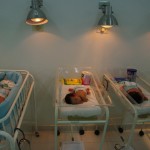
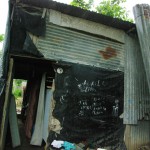
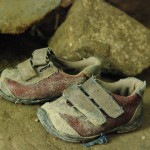

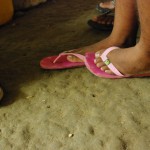
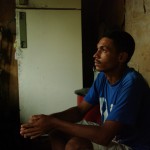
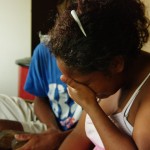
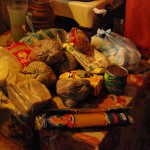

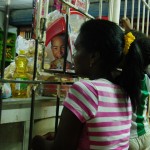

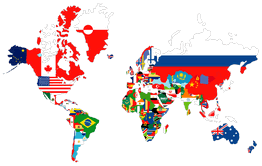
How bizarre, that the world operates the way it does: so many extremes, with so little awareness of the insanity involved in these extremes, and so much ignorance of all the “territory” in between them where moderation and health and wisdom and compassion lie. Solutions to problems such as hunger seem like common sense – if people are hungry, feed them; share the wealth, etc – yet ideas like this are considered to be “idealistic”, meaning “unrealistic”.
Your efforts may seem small in the scheme of things, yet they are truly significant. We may sometimes wish we could wave a magic wand and eliminate suffering, yet of course we cannot. We do what we can do, and trust the rest to a power far greater than any of us can fathom. Keep up your good works, knowing that they are not in vain.
That’s pretty heart wrenching Chris. You certainly don’t have even a minor shoplifting problem around these parts. I can’t imagine bars on a grocery store.
I can only imagine how hard that is to see all those people who have nothing. I’ve been extremely fortunate and never had to worry about not eating or having proper living conditions. Thank you for opening my eyes to this.
A donation is coming your way. Being a poor college student it won’t be much. But I hope that it can help feed someone you meet along your travels.